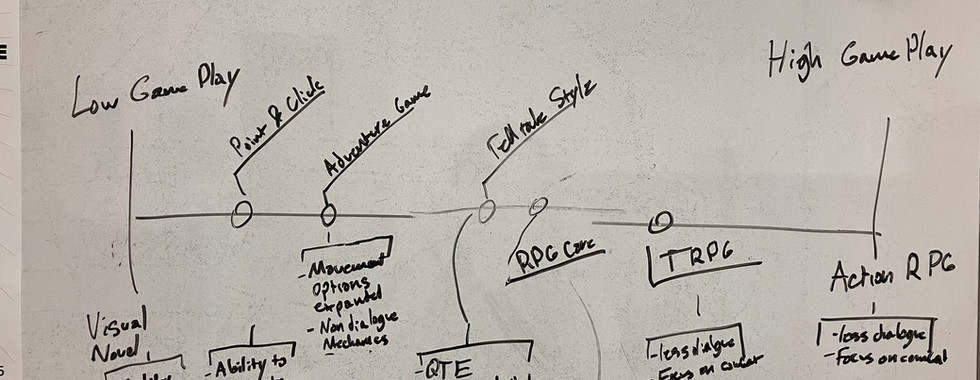The Start of Another Journey
- Skye Winters

- Aug 28, 2025
- 6 min read
In the following blog post I talk about my return to grad school for my second-year of three and transitioning out of my summer internship. I also go over the current trajectory for my thesis and my plans for the coming semester.
Dates: 8/24/25 - 8/30/25
A Summer of Experience
Over the summer, I had the privilege of working with the James Cancer Hospital in Columbus XR team, JXRETI, to create nursing education software to help better prepare nursing staff for emergency situations. Through my work, I had the opportunity to develop an educational game where trainees would learn the locations and preparation guidelines for the key elements of a Crash Cart. To assure that the project would actually be useful and usable by nursing staff, I also had the chance to interact with over 25 different nursing staff through playtest sessions where they would be able to give feedback on the project. Through doing so, we were able to greatly refine and clean up our VR interactions to help them be intuitive for a range of VR experience levels ranging anywhere from never worn a headset before to being a recreational beat saber player.
Additionally, I got to assist with the prototyping of two future projects for the lab to help address core hospital goals. The first was an application using hand tracking to teach nurses about CLABSI procedure to help minimize mistakes when performing a dressing change. Meanwhile, the second was a scenario builder to train nurses in a variety of situations with patients who are at risk of falling and injuring themselves ranging anywhere from identifying tripping hazards to teaching best practices for monitoring patients in the restroom.
Overall, through this internship, I had the chance to learn more about Serious Games development and how we could use games not only for entertainment applications but also for educational opportunities outside of academia. Additionally, I was able to work side by side with industry developers to learn more about what does and does not transfer from the academia bubble.
So where to next?
Overview
While working this summer at the James, I also had the opportunity to begin looking deeper into the literature around my thesis topic of Emotional Attachment to NPCs / NPC believability. Through my findings I have been able to identify a gap in looking for ways to apply social behaviours and social emotions to NPCs amongst NPCs in story driven games with companion NPCs. Yet those are very common in games of the genre.
For example, here are some story-driven games with companion NPCs:
The Last of Us: Ellie
Life Is Strange: Chloe
Life Is Strange 2: Daniel
The Walking Dead: Clementine
Bloom and Rage Lost Records: Autumn, Nora, and Kat
Balders Gate 3: Your party members
Expedition 33: Lune
Also to clarify, when I say Companion NPC I am referring to NPCs that “[...] accompany the player during the whole game (or at least most parts of it).” (Emmerich et. al).
In particular, with my studies I would like to begin by researching how we can trust and interpersonal relationships between NPCs in story-driven games to increase the believability of companions. For example, what if instead of friendships being isolated metrics from one NPC to another, we make it so that if you befriend character A then Character B might become jealous and Character C will like you more. To accomplish this, I will be participating in three courses this semester to begin work on my thesis.
First and foremost, I will be learning to conduct a Meta-Analysis under Dr. Brad Bushman to better understand what work has been done towards making believable NPCs. Meanwhile, I will be studying under Professor Yvette Shen in the methodology of Research Through Design to better understand how to create meaningful discoveries through my research. And then finally, I will be working with Professor Maria Palazzi, Professor Shadrick Addy, and Professor Scott Swearingen to begin conducting my thesis research. In the next sections I will be going into more detail about what each of those will look like. Overall, it's looking like this semester will be a great opportunity for me to advance my studies.
Meta Analysis
For this first week, we began looking into the overall process of Meta Analysis and learned the importance of them in maintaining the literature.
The general process typically goes as follows:
Formulating the problem
Searching the literature
Gathering information from studies
Evaluating the quality of the studies
Analyzing and integrating the outcomes of studies
Interpreting the evidence
Presenting the results
Also for those curious, the main reason behind conducting these types of literature reviews is to
Bridge the gap of knowledge by organizing the literature in a systematic way.
Discover conclusions through observing the outcomes of various papers in the literature and what they say about one another
For next week, I will need to properly define my project area to be able to effectively conduct my Meta-Analysis.
Research Through Design
For this week, the primary goal was to better understand what RtD is and how to apply it to my research area. To accomplish this, my classmates and I participated in a group discussion with Professor Shen covering the 5WH of RtD. Afterwards we then each worked on better fleshing out our problem space through a framework created by Professor Shen. Below you can see an example from my own writings on the topic. Then we concluded the class with a group discussion where we each shared our current problem statement and received feedback on what questions our classmates would like to see answered which I have compiled at the end of this section.

Problem Statement: How do we improve dialogue systems to meaningfully increase an NPC’s believability and allow for greater levels of PSR?
Q&A:
How do you define believability?
Is it relative to the player or to the player character?
What is the role in the narrative of the NPC?
What is the archetype of the NPC?
What separates it from humanity currently?
What kind of game are you thinking about?
How real should the NPC be?
How do you define real?
For what audience are you concerned about?
Why is it important to be real?
Independent Studies
For this week, I worked with Professor Palazzi in better defining how my research could be conducted in a way that leverages the skills that I have. We began first with a discussion of the difference between the visual and systems that make up a narrative system.
Below is a table breaking down example elements to illustrate this:

After our discussion, we concluded that due to my background in software, the best contribution I could make through my thesis to this area of study is to create a set of narrative design tools that could improve the way games currently approach narrative systems. Thus to better understand what has been done and what could be improved on, the next steps will be to start conducting a series of case studies on narrative driven games to see what works and what does not work. For the first phase of my thesis, I will be looking into dialogue systems so that is where I will be beginning my analysis.
Below is my current compilation of notes on games with narrative driven games:
Additionally, I also worked with Professor Swearingen to begin determining an overall plan for my thesis with this week's topic of discussion being the possibility of conducting a joint thesis with a collaborator of mine, Rae Watters. He is a fellow grad student who specializes in Narrative Game Design and is looking into creating narratives for increasing trans acceptance. Through collaborating on our thesis I would assist with the creation of a game to showcase his narrative / findings and he would assist with the testing and utilization of my narrative tools I develop. Furthermore, I will be looking to meet with several narrative designers in the coming weeks to better understand how I could improve upon their processes / workflows.
The Wrap up
Overall, this semester has started off strong with several systems already put into place to help with the development of my thesis. In the end my goal still remains to create something that would be worth using for game designers that could help push the boundary of what is possible with NPC characters.
Work Cited
Emmerich, K., Ring, P., & Masuch, M. (2018). I’m Glad You Are on My Side: How to Design Compelling Game Companions. Proceedings of the 2018 Annual Symposium on Computer-Human Interaction in Play, 141–152. https://doi.org/10.1145/3242671.3242709











Comments